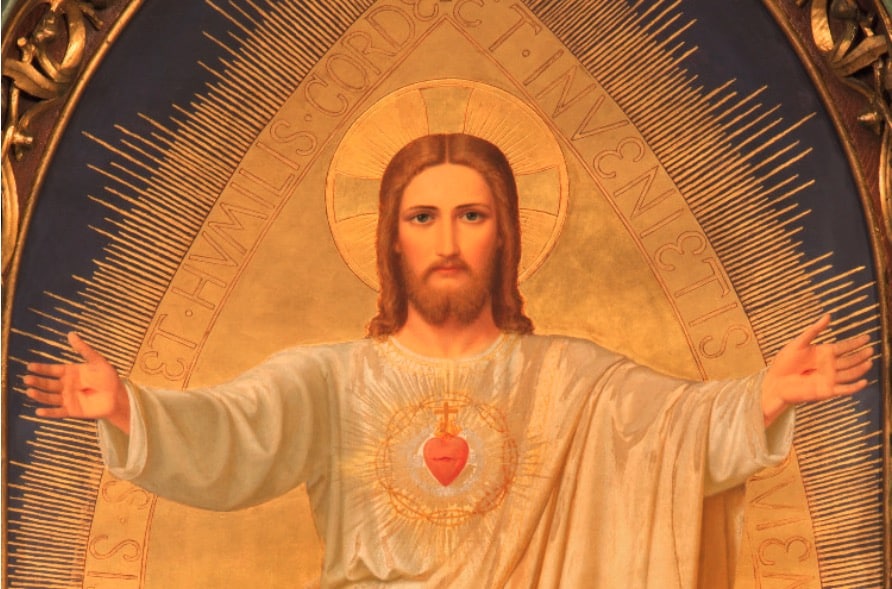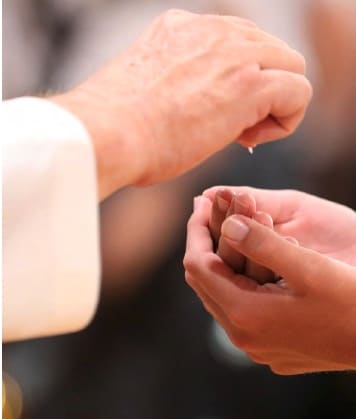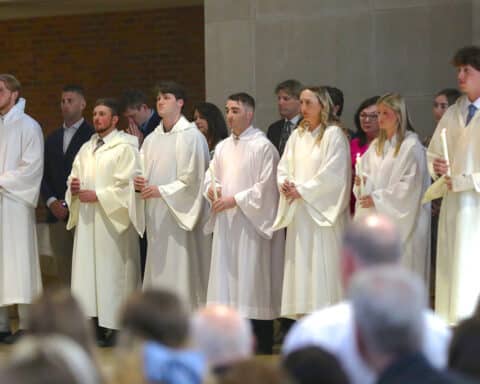If the phrase “a personal relationship with Jesus” gets your Catholic antenna up, you are not alone. Many Catholics have a negative reaction when they hear it. Numerous Catholics believe it is a phrase taken from evangelical Protestants and is not very Catholic. They might also charge that it shuns the communal aspect of Christianity. But what if I told you that not only does the phrase have Catholic roots, but is important for us today? If you doubt this, I ask you to consider the following argument.

Before I dive deep into the argument, I want to point out that those who have difficulty with the phrase have a valid point we need to consider. We can’t have a personal relationship with Jesus on our own terms; it has to be on the terms of Jesus and the Catholic Church. Thus, the Catechism of the Catholic Church says, “By faith, man completely submits his intellect and his will to God. With his whole being man gives his assent to God the revealer. Sacred Scripture calls this human response to God, the author of revelation, ‘the obedience of faith'” (CCC 143).
To submit means the relationship is to be conformed to Jesus and his Church. Furthermore, we can’t settle for just a me-and-Jesus relationship and think we are done. It isn’t Jesus or the Catholic Church. Rather, it is a relationship with both, which means we need a community (the Body of Christ) as well. It is both/and, not either/or.
Yet, in many ways, we have over emphasized the relationship to the Church and somewhat neglected the personal response of faith to Jesus, at least in modern Catholicism in the West. So, let us not ignore that we need to emphasize the personalistic aspect in order to make up for the deficit.
With that in mind, I would like to propose how all of us can be called to have a personal relationship with Jesus and the Catholic Church. The implications of such relationships can be life-changing.
|
— Pope Francis |
Jesus and the Church
When I was dating my wife, I wanted to spend as much time as I possibly could with her. Why? Because I wanted to know her personally. I wanted to know what she liked and what she didn’t. I wanted to get to know her pet peeves and what her passions were. I wanted to know everything I could about her. But, above all, I had to learn how to make choices that showed I loved her. This is what happens when you love someone — you want as close, intimate and personal of a relationship as you can, appropriate to the kind of relationship it is, of course.
Yet, while the relationship with my wife is the primary human relationship in my life, I shouldn’t neglect others because of her. If I were to never talk to other family or friends, that isn’t good for me, my wife or others. The same is true with Jesus. While a relationship with him is primary, it isn’t the only one.
Still, all of us are called to have a close, intimate and personal relationship with Jesus. In other words nobody else’s faith can get you to heaven or make you holy. It has to be your own. My parents’ faith can’t get believe in Jesus for me. My spouse’s faith cannot save me. The faith of my parish community is not enough to wash away my sins. Faith, forgiveness, mercy, hope, love, grace, etc., must be freely chosen by each disciple of Jesus — thus making it “personal.” We need not be afraid to use such language because it helps us to understand that each one of us is responsible for our own life of faith. It also helps us counter something lacking in our current Catholic culture, the under-emphasis on the need of each person to be converted to Jesus.
But, many Catholics may be unsure about what this might look like in everyday life. If you are one who is not sure how to do this, it is simple: As with any relationship, you choose how close you want to be with someone. It is a choice only you can make. Many who are Catholic (as well as other Christians) have merely an intellectual or emotional connection to God, but not a personal one they have chosen in faith — that is to intentionally choose to love Jesus, believe in Jesus, and follow him, through an act of the will in response to God’s grace. To intellectually know Jesus (to know about Jesus) or have a movement of the emotions (to feel good about Jesus) are both good things, but by themselves are not enough. Remember that even the demons know about Jesus and that we will all have times we don’t feel good about Jesus. This is why we must choose Jesus in faith, which is done through an act of our will. Of course, faith is really a response to grace, and thus us being able to say “yes” to Jesus is only possible because God has chosen us first.
Once you choose Jesus by faith, you have to do it again and again. It isn’t a one-and-done faith. The Church has never taught that salvation is once saved, always saved. A life of faith is lived out in prayer, participating in the Sacraments, growing in virtue, living in community, shunning sin in our lives (repenting as well), serving God and others, and helping others come to know, love, serve and follow God (evangelizing). Jesus is Lord of all, and as a servant to our king, we must serve him and others. This is what he commands of us. I can’t say I love my wife and not serve her. The same is true with Jesus.
When we submit our lives to Jesus in faith, we also must submit to the Church he established. We can’t merely make it up as we go, but must follow the commandments of God, which have been preserved via God’s Church — the Catholic Church. That is why we must also have a personal relationship with the Catholic Church. This means knowing what she teaches, sharing in the communal life of a parish, serving the wider community we live in, receiving the Sacraments, explicitly proclaiming the Gospel, etc. Still, we must also remember that these things by themselves cannot save us, without the personal relationship with Jesus.
|
— Pope Benedict XVI |
Truly Catholic
This concept of having a personal relationship with Jesus may still sound too “Protestant” to some Catholic ears. We need to push back against that tendency, because we have much to gain by doing so. The Catholic Church has been using the language long before our Protestant brothers and sisters were ever around, and the Church has never lost touch with this language, even if some individuals or communities have, in some ages (see sidebar).
Not only should we not be scared of talking about a personal relationship, we need to continue to work on our own. If God is love itself, then that love is experienced, lived and shared with others after we have each entered into a relationship with God — either for the first time or anytime we go deeper into that relationship. Think of it this way: Every time you do the following things, you are working on your personal relationship with Jesus (as long as you choose him out of love and faith):
- Set time apart daily to pray. This time shouldn’t just be prayers that are done merely out of obligation. Our goal should be intimate union with God. As the saints tell us to do, we need to speak to him as we would a friend. When we are done talking, listening is even more important. This is personal prayer.
- Actively receive the sacraments. I know that you can put off going to confession, but I have never regretted my time spent in going, once I committed to a monthly date with Jesus in the confessional. Building on this, we need to try to enter more deeply into Mass. There is no better place to work on our personal relationship with Jesus than when we receive him into our bodies and souls in the Eucharist. The depths of graces we can mine in the Eucharistic relationship have no end.
- Read and meditate with sacred Scripture. The Bible is written for each of us. The Church says that each time we study and pray with Scripture (if we do so in a spirit of prayer), we have the opportunity to once again encounter Jesus. We can learn more about him, but the point is to ultimately love him more as well.
- Choose to grow in virtue. I’m sure that most of you are like me and need to grow in a few virtues. My best times of growth in my spiritual life are when I have responded to the promptings of the Holy Spirit to work on one or two virtues. It takes an honest look at our failures and conviction that God wants more of us, but there is never any regret in choosing to respond to God and work on growing in virtue.
Perform acts of mercy and serve others selflessly. Everyone wants to be served, and God has put us on this earth to serve others. The good thing is, we get something out of it too. When we give ourselvdes away in loving service to others, we grow as disciples. We get back when we give to others. God is never outdone when we love him and others.
- Evangelize others. If there is one area of Catholic life we need to grow in as Catholics in the modern world most, it may be in being bold in sharing our faith. An interesting fact: The universal call to holiness cannot be separated from the universal call to evangelize. Nobody has ever truly become a saint until they are on mission and fruitfully evangelizing. Pope St. John Paul II said, “The universal call to holiness is closely linked to the universal call to mission. Every member of the faithful is called to holiness and to mission” (Redemptoris Missio, No. 90).
When I promised I would love my wife in our wedding vows, it wasn’t merely an emotional act (though emotion played a part and there is nothing wrong with that) or because I knew a lot about her (knowing about her was and is a good thing). Rather, I made a personal act of the will to love my wife that day and every time I choose to love her again, I affirm that initial commitment I made in my vows.
|
— Pope Saint John Paul II |
Catholic conversion
The same can be said for my personal relationship with Jesus and his Church. A close, intimate and personal relationship with Jesus doesn’t happen by accident. You must choose it, and that choice must be intentional. In fact, it is possible to be Catholic and not have a personal relationship with Jesus. I was one of these Catholics.
I was raised Catholic, by amazing and holy parents. I stopped going to Mass because I never personally believed in Jesus, even if my parents did. Later as a young adult, I encountered Jesus personally in a powerful way. I knew that he was real. I knew that he loved me. I knew that he would forgive my sins. He could heal me. He could transform me.
He did all these things and I chose to follow him. I remember the night this happened. I ended up going to confession, giving Jesus all my sins and then telling him that “I am not sure what this even means, but I am yours.” This was the night my personal relationship with Jesus started — when I was converted to him and chose to follow him as a disciple.
My life has never been the same. It was that time that I entered into a personal relationship with the mystical body of Christ, the Catholic Church as well.
I chose to follow Jesus, but this choice has to be intentional. Have you ever actually read a legal disclaimer that goes with the terms of use for a new app on your phone? Did you understand it all? Even if you didn’t, you probably still checked that you would “read and agree” to everything in the document. This kind of half-hearted consent is similar to what happens for a lot of Catholics every Sunday. Many Catholics aren’t really paying attention to what the words mean, but are half-heartedly going through the motions. We all know it happens, but the real question is: If we aren’t giving our consent, can we have real conversion?
The answer is no. This is because true conversion requires our consent. To be converted to Jesus cannot happen by accident or without our “yes.” Unlike a legal contract, conversion requires more than an outward act.
The root of the word “convert” means to “turn around,” “change” or “transform.” Think of turning from sin, death, evil and hell to orient yourself toward grace, goodness, virtue, heaven and everlasting life. It is the transformation of the human heart, by an act of God’s grace.
Thus, we sometimes call one who becomes Catholic a “convert,” which means they have turned from their previous beliefs and now are Catholic. We all know that many of the most vibrant Catholics have come from other faith traditions or no faith at all to become Catholics. Why are they so vibrant? It is because they had to consent to becoming Catholic, and their consent made all the difference. Consent is the “yes” to the invitation of Jesus. This is the beginning of a relationship.
The Church has similar language for the Sacrament of Matrimony, and it is why a marriage cannot be validly entered into without free consent of both spouses. No true relationship is coerced or accidental. This is also found in Biblical language about relationships.
Scripture
There is a dynamic of encounter, invitation, consent and conversion in the Biblical language when Jesus enters personally into a relationship with someone. It looks like this:
-
- Encounter with Jesus.
- Invitation to relationship with Jesus.
- Consent to be in relationship with Jesus.
- Discipleship and mission.
We can see clearly that you can’t be a disciple until you consent to believe and follow. You can’t have a relationship with Jesus you don’t consent to. You can’t consent until you have been given the grace of an invitation and know what you are consenting to. You can’t get an invitation to Jesus until you have had some kind of encounter with Jesus.
While God’s grace always comes first, grace is not magic. God waits on our permission to save us, when we have the ability to give it. Thus, we have to give our “yes” before we can be changed. Notice the consent in these stories of conversion.
| Conversion stories |
|---|
|
Conversion of St. Andrew (John 1):  The conversion of the woman at the well (John 4):  The re-conversion of St. Peter (John 21): 3,000 conversions at Pentecost (Acts 2): |
With our response to God in mind, let us remember that God always acts first. The almighty God of the universe desires a relationship with us much more than we ever could desire it with him. With the perfect heart of a perfect father, he pursues and works to draw all people to himself. He is always present to everyone (he is omnipresent, so he has to be with everyone at all times). So our job isn’t to make him present but, rather, to make his presence known. Many have been sacramentalized, catechized and yet still have not had an initial conversion to Jesus. Pope St. John Paul II said this: Many “only have the capacity to believe placed within them by Baptism and the presence of the Holy Spirit.” Notice grace has been received (capacity), but they have not consented to it, and thus it isn’t fully operative in them.
Everyone is called to a personal relationship with Jesus and his Church. This is the will of God for the world. This relationship takes your consent. If you have never done this, maybe now is the time to stop reading and make an act of the will, in faith and prayer. If you have already done this, there is no end to the depths you can go with Jesus, so don’t stop.
Marcel LeJeune is the president and founder of Catholic Missionary Disciples (CatholicMissionaryDisciples.com).
| Further resources |
|---|
|
Want to dive further into your relationship with Christ? Check out the OSV Catholic Bookstore for some great resources, including: “Listening for God in Everyday Life” ($9.95) by Joseph D. White, Ph.D. “How to Pray: A Practical Guide to the Spiritual Life” ($12.95) by David Torkington “Living Metanoia: Finding Freedom and Fulfillment in Christ” ($18.95) by Father Dave Pivonka, TOR Find these and other great titles at osvcatholicbookstore.com. |


 “Being a Christian means having a living relationship with the person of Jesus; it means putting on Christ, being conformed to him.”
“Being a Christian means having a living relationship with the person of Jesus; it means putting on Christ, being conformed to him.”
 “Christian faith is not only a matter of believing that certain things are true, but above all a personal relationship with Jesus Christ.”
“Christian faith is not only a matter of believing that certain things are true, but above all a personal relationship with Jesus Christ.” Perform acts of mercy and serve others selflessly. Everyone wants to be served, and God has put us on this earth to serve others. The good thing is, we get something out of it too. When we give ourselvdes away in loving service to others, we grow as disciples. We get back when we give to others. God is never outdone when we love him and others.
Perform acts of mercy and serve others selflessly. Everyone wants to be served, and God has put us on this earth to serve others. The good thing is, we get something out of it too. When we give ourselvdes away in loving service to others, we grow as disciples. We get back when we give to others. God is never outdone when we love him and others. “It is necessary to awaken again in believers a full relationship with Christ, mankind’s only savior.”
“It is necessary to awaken again in believers a full relationship with Christ, mankind’s only savior.”


